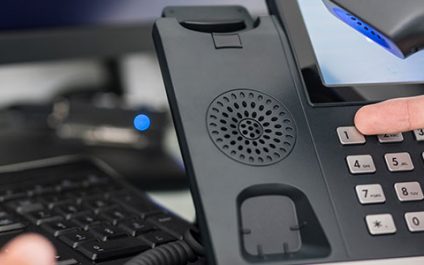Are you thinking about installing a new business phone system or upgrading your existing one? If you are, you have the choice between VoIP softphones and hardphones. But which one is better? This article will tackle the differences between the two types of VoIP phones and which one your business should get. VoIP Softphones Softphones […]
VoIP softphones or hardphones: Which is better?
What are the different VoIP options for SMBs?

Voice over Internet Protocol (VoIP) as a telephony solution allows small- and mid-sized businesses (SMBs) to choose between traditional desk phones (hardphones) or software-based devices (softphones). Read on to learn which option best suits your organization’s needs. What’s a hardphone? A hardphone functions like a normal phone, but it’s connected to your business’s IP network […]
Why you should consider softphones over desk phones
Desk phones that sit in the office are quickly becoming obsolete as many employees work off-site. Instead of traditional telephony systems, forward-thinking businesses are using softphones for most, if not all, of their communications. If your company hasn’t already done so, here are five compelling reasons why you need to start using softphones. Anytime, anywhere […]
VoIP hardphones or softphones for SMBs?
Your company has decided to avail of Voice over Internet Protocol (VoIP) and has given you the task of choosing between the two types of phones: traditional desk phones (hardphones) or software-based phones (softphones). To help you decide, we’ll break down the benefits of each type. What’s a hardphone? A hardphone is a desk phone […]
Which VoIP service is best for you?
Is it better for your company’s Voice over Internet Protocol (VoIP) system to be on-premise or cloud-based? What’s the difference between a mobile VoIP client and a software-based application? What VoIP service is best for your business? The following compilation of VoIP options will help you answer these questions and choose the ideal service for […]
VoIP Hardphones vs Softphones
You have just decided to use VoIP as your telephony solution, but now your technician is asking how you want to use it. Do you want traditional desk phones (hardphone) or software-based devices (softphone)? Read on to discover the benefits of each and which ones are most suitable for your needs. What’s a hardphone? A […]
Which VoIP service suits me the most?
Gone are the days when you have to spend a large amount of money each month on the telephone bill. Voice over Internet Protocol (VoIP) technology has made it cheaper — and in most cases, free — to place and receive calls. Whether you’re a business owner or an individual user, there is a VoIP […]
A Primer of Softphone Technology for PABX
Softphones make communication much easier by using an internet connection to make a call. But for businesses, PABX softphones offer much more secure communication for your day-to-day operations. Technology has always had a profound impact on the way we do business, especially these days with the constant need to stay in touch with bosses, clients, and co-workers. A breakdown in communication often means a dip in productivity – so you always need to have the best and most effective means of communication at your disposal. One of these means is softphones, which are basically software programs that allow you to make calls in much the same way as you do using a telephone or mobile device, except it’s through your internet connection. The most popular softphones include Skype, MagicJack, or Yahoo Messenger’s call feature. However, there are also softphone technologies that can utilize your PABX (private automatic branch exchange) network, which – while more limited in a general sense – are much better for businesses because of the security they offer. Softphones on PABX work better for business purposes because of the nature of the PABX networks themselves. The privacy and exclusivity for your business communications are maintained, and PABX softphones make communication convenient without compromising security. If you want to know more about softphone technology for your PABX network, please don’t hesitate to contact us and we’ll be happy to discuss a detailed service blueprint that will work for you.


